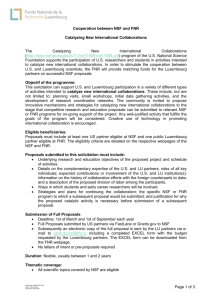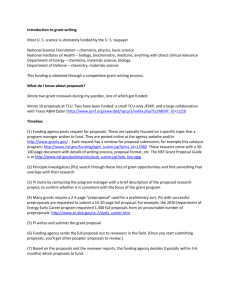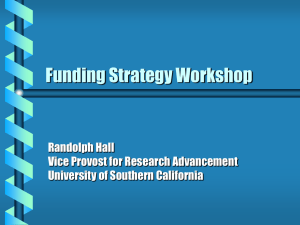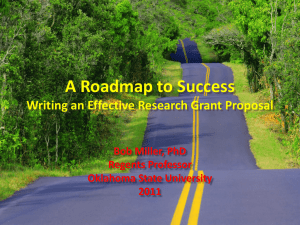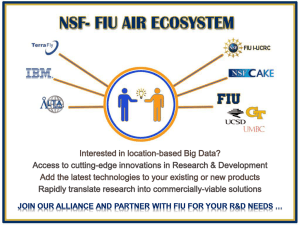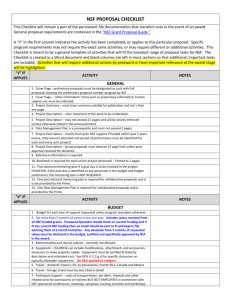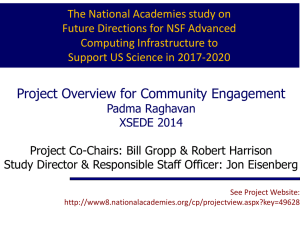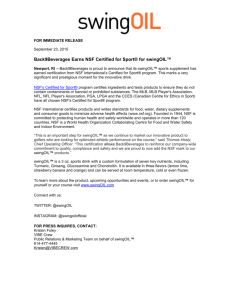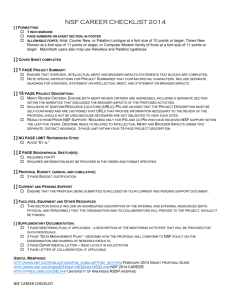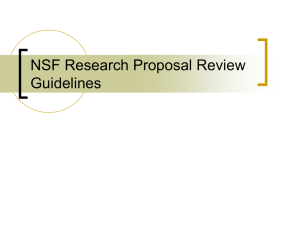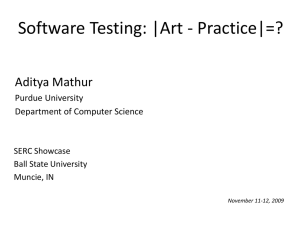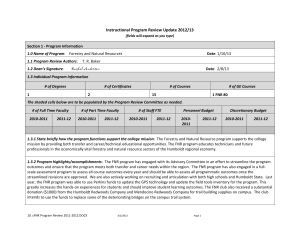NSF-FNR Catalyze Programme
advertisement
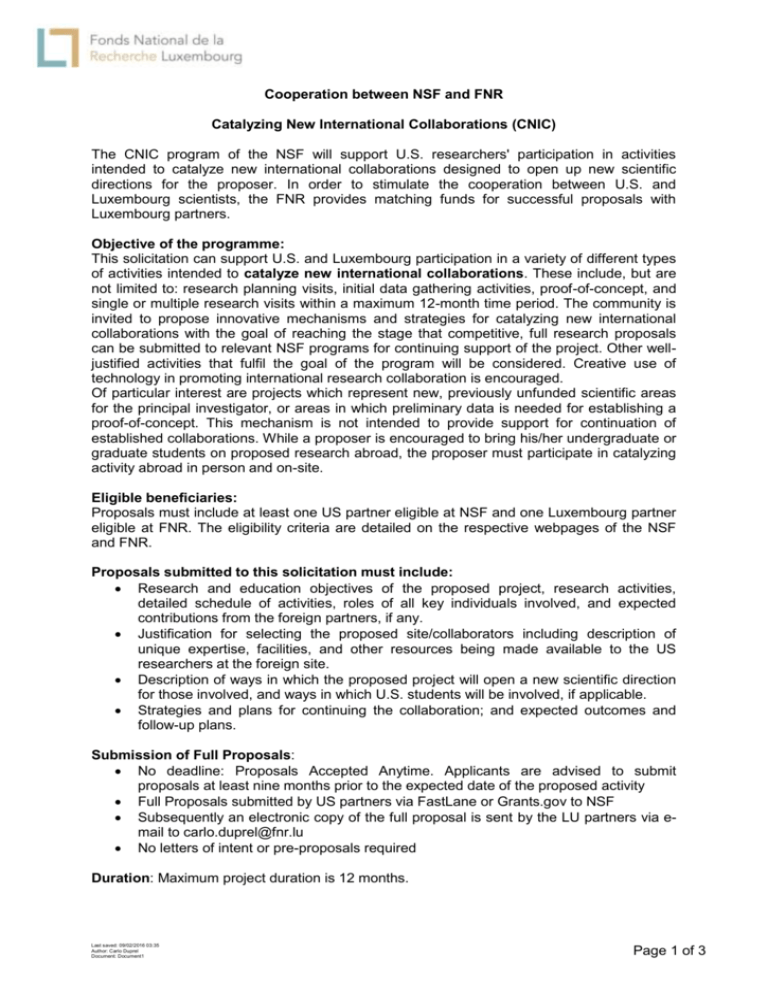
Cooperation between NSF and FNR Catalyzing New International Collaborations (CNIC) The CNIC program of the NSF will support U.S. researchers' participation in activities intended to catalyze new international collaborations designed to open up new scientific directions for the proposer. In order to stimulate the cooperation between U.S. and Luxembourg scientists, the FNR provides matching funds for successful proposals with Luxembourg partners. Objective of the programme: This solicitation can support U.S. and Luxembourg participation in a variety of different types of activities intended to catalyze new international collaborations. These include, but are not limited to: research planning visits, initial data gathering activities, proof-of-concept, and single or multiple research visits within a maximum 12-month time period. The community is invited to propose innovative mechanisms and strategies for catalyzing new international collaborations with the goal of reaching the stage that competitive, full research proposals can be submitted to relevant NSF programs for continuing support of the project. Other welljustified activities that fulfil the goal of the program will be considered. Creative use of technology in promoting international research collaboration is encouraged. Of particular interest are projects which represent new, previously unfunded scientific areas for the principal investigator, or areas in which preliminary data is needed for establishing a proof-of-concept. This mechanism is not intended to provide support for continuation of established collaborations. While a proposer is encouraged to bring his/her undergraduate or graduate students on proposed research abroad, the proposer must participate in catalyzing activity abroad in person and on-site. Eligible beneficiaries: Proposals must include at least one US partner eligible at NSF and one Luxembourg partner eligible at FNR. The eligibility criteria are detailed on the respective webpages of the NSF and FNR. Proposals submitted to this solicitation must include: Research and education objectives of the proposed project, research activities, detailed schedule of activities, roles of all key individuals involved, and expected contributions from the foreign partners, if any. Justification for selecting the proposed site/collaborators including description of unique expertise, facilities, and other resources being made available to the US researchers at the foreign site. Description of ways in which the proposed project will open a new scientific direction for those involved, and ways in which U.S. students will be involved, if applicable. Strategies and plans for continuing the collaboration; and expected outcomes and follow-up plans. Submission of Full Proposals: No deadline: Proposals Accepted Anytime. Applicants are advised to submit proposals at least nine months prior to the expected date of the proposed activity Full Proposals submitted by US partners via FastLane or Grants.gov to NSF Subsequently an electronic copy of the full proposal is sent by the LU partners via email to carlo.duprel@fnr.lu No letters of intent or pre-proposals required Duration: Maximum project duration is 12 months. Last saved: 09/02/2016 03:35 Author: Carlo Duprel Document: Document1 Page 1 of 3 Thematic coverage: All scientific topics covered by NSF are eligible Evaluation of proposals: Check of administrative eligibility by NSF and FNR respectively The scientific evaluation by three to ten independent persons who are experts in the particular fields is managed by the NSF Based on the evaluation results, the decision bodies of NSF and FNR take a funding decision The applicant teams are subsequently informed by NSF Selection criteria : Intellectual merit Broader impact Mutual benefits among partners; true intellectual collaboration with the foreign partner(s); and benefits to be realized from the expertise and specialized skills, facilities, sites, and/or resources of the international counterpart(s). The extent to which the proposed collaboration opens a new scientific direction for which the principal investigator is not yet funded; the extent to which proposed activities are likely to lead to potentially transformative contributions to research and education not possible without this catalytic step; and the extent to which the proposed collaboration contributes to the professional development of the principal investigator. Eligible costs and budget: The budget justification should explain and justify major cost items. Eligible expenses include international travel including subsistence, research supplies, bench-fees, and limited incountry travel expenses. Participation of students and postdoctoral fellows is encouraged, however the proposer must participate in research activity abroad in person and on site. Major equipment costs are not allowed. For living expenses abroad, applicants are encouraged to work with foreign counterparts to develop realistic budget requests. Funding levels will typically range from • from $10,000 to $100,000 for the activities of the US partner(s), • from 10,000€ to 100,000€ for the activities of the LU partner(s), depending on the type and scope of activities proposed. Partner budgets will need to be balanced. Special considerations: Prior to submission to this solicitation, it is required that PIs establish communication with Graham M. Harrison, Ph.D. Program Manager Office of International Science and Engineering (OISE) National Science Foundation 4201 Wilson Blvd. Arlington, VA 22230 phone:703-292-7252 email:gharriso@nsf.gov and Dr. Carlo Duprel Senior Programme Manager Last saved: 09/02/2016 03:35 Author: Carlo Duprel Document: Document1 Page 2 of 3 Fonds National de la Recherche 6, rue Antoine de Saint-Exupéry P.O. Box 1777 L-1017 Luxembourg Tel: +352 261925-37 / Fax: +352 261925-35 E-mail: carlo.duprel@fnr.lu Failure to consult the respective programme managers prior to submission may result in the proposal being returned without review. For further information : Please consult the complete programme description via: http://www.nsf.gov/pubs/2012/nsf12573/nsf12573.pdf Last saved: 09/02/2016 03:35 Author: Carlo Duprel Document: Document1 Page 3 of 3
